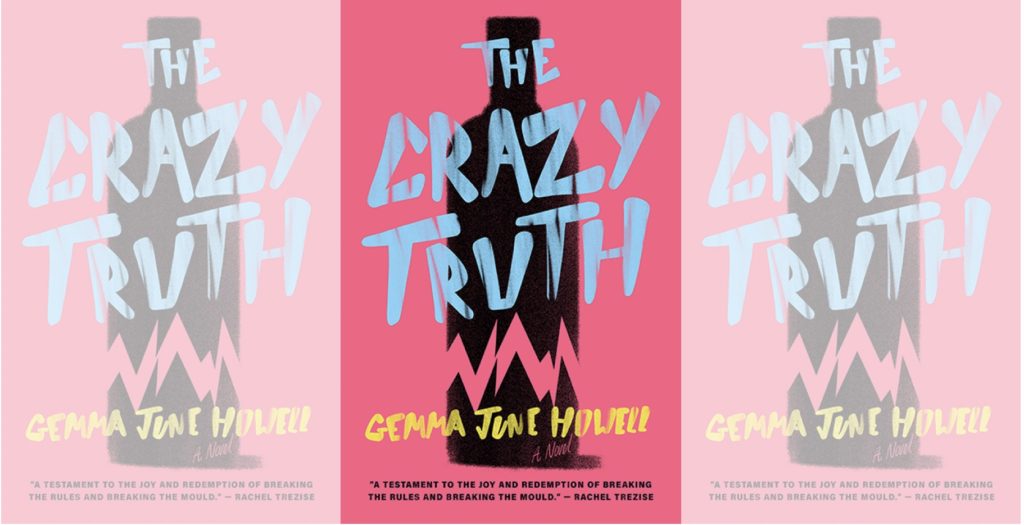Book review: The Crazy Truth by Gemma June Howell

Sophie Buchaillard
The Crazy Truth is Gemma June Howell’s debut novel, the story of three generations of working class women living in the Swansea area in 1980s Wales, told through a cast of characters with accents of modern Greek tragedy.
There is the daughter Girlo, abused and mistreated by the men in her life; her mother Crystal, her life driven by a succession of men willing to take care of her and the kids in exchange for sex – Girlo and her brother dragged from house to squat, and squat to high rise flat, whilst their mother drowns her sordid existence in alcohol, too drunk to recognise the dangers that lurk.
Finally, there is Nanny Pearl, the dutiful grandmother who takes over raising Girlo after her own daughter reveals herself unfit. On the face of it, this is a novel depicting every imaginable stereotype about the disenfranchised working class of the the post-industrial era. We have alcohol, drug and violence, we have incest, sex for hire, and that lingering sense of despair that leaves the reader uneasy and nauseated.
Howell’s writing is graphic, and her dialogues convey a dialectal form of expression that seeks to draw you into Girlo’s world, dragging you down with her. The first chapter, entitled VODKA, introduces you to Girlo at the end of a night out on the town “The night was over. The clingfilm skin-and-bones of Girlo lay on a state issued mattress. Lungs ablazin’ from the weekend sesh, she snatched her breath in scanty gasps. Her tongue cracked. SLAM. Where the fuck wuz she?’
Uncomfortable
Howell aims to make the reader uncomfortable, and with this reader she definitely succeeds. Yet, this novel is as far from the stereotype because although it depicts a working class perspective reminiscent of Douglas Stuart’s Shuggie Bain, the fact the novel is set in Swansea and adopts the point of view of working class women, offers a rare insight into characters usually presented as a footnote.
Abuse
At first, the characters appear at the mercy of societal cycles of abuse, alcohol and early pregnancies. This is the legacy of the post-industrial era too, Howell shows us: generations of women trapped, fated to survive rather than to live.
And yet, Howell’s novel does not wallow in self-pity. Instead, it offers a feminist take on the working class experience, and in so doing pushes back against a patriarchal hegemony which crystallises being ‘working class’ as a chronic condition. It is a brave novel that questions what it means to be working class today? Girlo’s father is an academic, after all. And she, too, develops aspirations to attend university and become a writer.
Tribal
Howell shines a light on a social classification inherited from the industrial era that long ceased to be about occupation, becoming instead almost tribal, with its own language, culture and myths. Rejecting linear over-simplifications however, Howell describes her novel as ‘transgressional’ in the author’s notes. It is certainly unapologetic, and a pinch hopeful.
Passed the grim, sordid experiences, and despite the omnipresence of death, The Crazy Truth is a story about life, family life, talent, and breaking the mould – told in a non linear, hybrid form. Alternating perspectives and timelines weave Girlo’s evolution (I want to write revolution), alongside a series of poetic vignettes: those calligrammes re-claim the over-affected form popularised by Guillaume Apollinaire to illustrate the reality of Girlo’s life through the normalised shapes of her childhood: a cock, a bottle and a bong.
At the same time, they exemplify for the reader the parallel between her developing creative practice, and her gradual change of circumstances. If she first follows in her mother’s footsteps, eventually she claims her independence, and redraws her circumstances in the shape of a matriarchal tree.
Generational poverty
More widely, reading The Crazy Truth made me reflect on the dichotomy between local and global and the relatability of an experience so anchored in a particular place as to make it hard to reach, at times. The voices are certainly skilfully executed, and to another reader I am sure they will add to the authenticity of the experience.
Personally, I found the dialogues tiring to decipher, and distracting. Ultimately though, generational poverty, for this is what this book is about, is a plague easy enough to recognise, and which ought to make us all feel embarrassed. At times the depictions made me want to vomit. And thus, Howell succeeds by conjuring up a world of bile and guts, dragging her reader by the nose through the stench of urine and blood, yet executing a work of fierce artistic integrity which speaks to redemption and independence.
The Crazy Truth by Gemma June Howell is available from all good bookshops and published by Seren.
Support our Nation today
For the price of a cup of coffee a month you can help us create an independent, not-for-profit, national news service for the people of Wales, by the people of Wales.





While I appreciate this review’s engagement, it’s clear that the reviewer hasn’t read The Crazy Truth in full, as some comments are based on the very assumptions and ‘stereotypes’ they critique. There are also factual inaccuracies, such as Girlo being raised by her paternal grandmother rather than maternal, and the book’s setting is across the Welsh valleys, Cardiff, Swansea, and parts of England rather than just Swansea. The review itself illustrates entrenched middle-class sensibilities and sanitisation often imposed on working-class literature, demonstrating how systemic biases persist in these critical spaces. Unfortunately, this review serves as an example of epistemic hermeneutical… Read more »